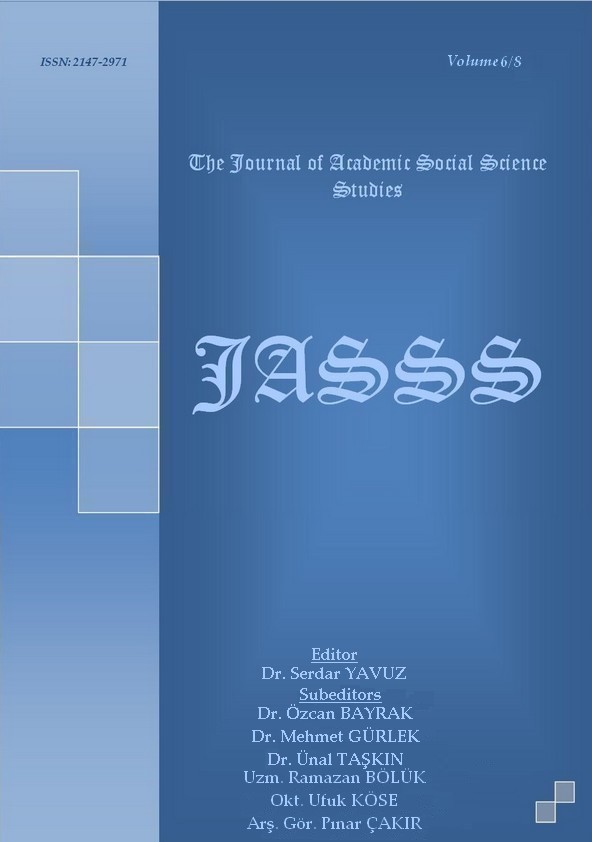Author :
Abstract
Osmanlı Devrinde imparatorluğun başkenti İstanbul’un Avrupa’ya açılımında önemli bir kapı vazifesi gören Vize şehrinin tarihi geçmişi, antik çağlara kadar uzanmaktadır. 1369 tarihinde Osmanlı Devleti tarafından fethini müteakip hızlı bir şekilde iskân ve imar edilen şehir, çok kısa bir zaman zarfında Osmanlı üst düzey devlet ricalinin ilgi alanına girmiştir. Osmanlı sultanları ve devlet idarecilerinin kurmuş oldukları vakıfların gelir kaynaklarına ve sahip oldukları dirliklere ev sahipliği de yapan şehrin yıldızı özellikle XVI. yüzyılda parlamıştır. XVI. yüzyılda üçte biri gayrimüslimlerden oluşan vize şehrinde Müslümanlar ile gayrimüslimlerin farklı mahallelerde oturduğu ve tetkik ettiğimiz dönem dâhilinde şehrin vergi nüfusunun az da olsa azaldığı görülmüştür. Vize kazasında şehirde yerleşik nüfusun köylerde ikamet eden nüfusun oldukça gerisinde olduğu da belirlenmiştir. Ayrıca Vize şehir merkezinde tarım sektörünün hizmet ve sanayi sektörlerinin önünde olduğu tespit edilmiştir. Vize kırsalında ise şehir merkezinin aksine gayrimüslim nüfusun ağırlıkta olduğu müşahede edilmiştir. Bununla beraber Vize köylerinde hububat üretiminin ağırlık kazandığı, hayvancılık ve arıcılık sektörleri ile bağ, bahçe ve bostan üretimin hububat sektöründen sonra geldiği çalışmamızda ortaya konulmuştur. Endüstriyel ürünlerden olan ve özelikle dokumacılıkta çokça kullanılan keten ile Osmanlı donanmasının halat ihtiyacının karşılanmasında hayati önem sahip kendir bitkisinin de az da olsa Vize köylerinde üretildiği tespit edilmiştir. Bu çalışmada 1530 tarihli muhasebe-i icmal defter ile 1568 tarihli mufassal tahrir defterinin verdiği imkân ölçüsünde Vize kazasının zirai, iktisadi ve içtimai yapısı ele alınmıştır.
Keywords
Abstract
Standing as an important door for the opening of capital city Istanbul into Europe during the Ottoman Period, the city of Vize has a historical background dating back to the ancient times. Inhabited and reconstructed rapidly after its conquest by the Ottoman Empire in 1369, the city was included in the area of interest of the Ottoman state dignitaries in a short time. The city hosted the sources of income of the foundations set up by the Ottoman sultans and state administrators as well as the dirliks possessed by them. The city became a shining star in the 16th century in particular. It was seen that one-third of the population of the city of Vize consisted of non-Muslims in the 16th century; Muslims and non-Muslims lived in different neighborhoods; and the tax population of the city decreased, though slightly, within the period under examination. It was found out that the urban population of the city of Vize was quite less than the rural population. In addition, agricultural sector was detected to be ahead of service sector and industry sector In Vize. It was observed that there were more non-Muslims than Muslims in the rural area of Vize in contrast to the case in the urban area. Moreover, the present study revealed that the production of cereals was important in the villages of Vize where the cereals sector was followed by stockbreeding, beekeeping, viniculture, horticulture, and market gardening. Linen, which was one of the industrial products heavily used in weaving, and hemp that had a vital importance for meeting the rope needs of the Ottoman fleet were also produced in the villages of Vize though such production was limited. This study dealt with the agricultural, economic, and social structures of the district of Vize within the possibility provided by the condensed accounting book dated 1530 and the detailed tax register dated 1568.





